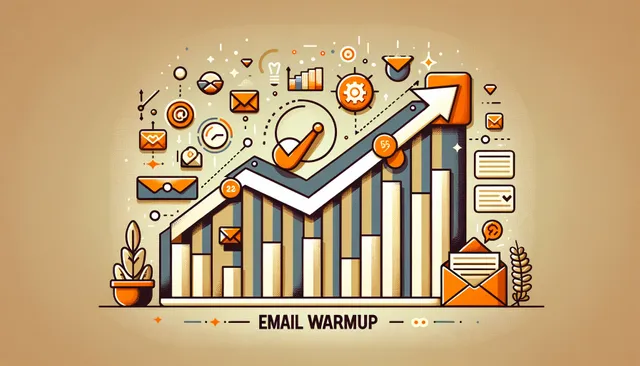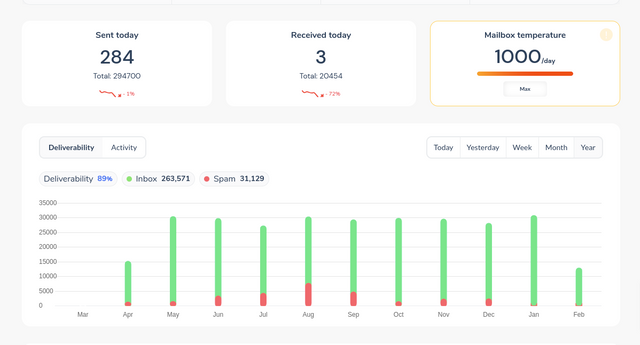
In today's digital landscape, the journey of an email from sender to inbox has become more complex than ever. The art of email warmup has emerged as a crucial strategy to navigate this path successfully. This process isn't just a mere technicality; it's a game-changer for anyone looking to cut through the noise and make their message heard.
Whether you're a seasoned marketer or just starting out, understanding and implementing email warmup can significantly boost your chances of landing in the coveted inbox, setting the stage for meaningful engagement with your audience. Let's dive into the nuances of email warmup, uncovering why it's essential and how to master it for your campaigns
Understanding Email Warmup
Definition and Importance
Email warmup is a process designed to gradually increase the volume of emails sent from a new email account, establishing a reputable sender reputation with email service providers (ESPs). This gradual approach helps mimic human-like activity, avoiding any red flags that automated spam filters might detect.
The Role of Email Warmup in Email Marketing
For email marketers, the warmup process is critical, directly influencing deliverability rates and, ultimately, the success of their campaigns. A well-executed warmup strategy ensures that your marketing messages reach your audience's inbox, enhancing engagement and conversion opportunities.
The Mechanics of Email Warmup
How It Works: A Step-by-Step Guide
The email warmup process begins with sending a low volume of emails, gradually increasing the count over a specified period. This might start with as few as 5-10 emails per day, eventually reaching your target daily volume over several weeks or months, depending on your specific needs and goals.
Automated vs. Manual Warmup: Pros and Cons
While manual warmup gives you complete control, allowing for personalized adjustments based on immediate feedback, it can be time-consuming. Automated solutions, on the other hand, offer convenience and consistency, essential for busy marketers. However, selecting a reliable service is crucial to ensure the automation aligns with best practices.
Best Practices for Effective Email Warmup
Choosing the Right Starting Volume
Starting with a low volume is key; too many emails too soon can harm your sender reputation. Begin with a number that feels manageable and not suspicious to ESPs.
Incremental Increase and Optimal Frequencies
Gradually increasing your sending volume helps ESPs recognize your account as legitimate. A common strategy is to double the sending volume every few days, closely monitoring deliverability and engagement metrics.
Content Matters: Crafting Warmup Emails
The content of your warmup emails is just as important as the volume, with personalization and engagement being paramount. Crafting messages that encourage a response or action can significantly improve your sender score.
Monitoring and Adjusting Based on Feedback
Keeping an eye on key metrics like open rates and spam reports can guide adjustments to your warmup strategy. Responsive adaptation is key to navigating the complexities of email deliverability successfully.
Tools and Services for Email Warmup
Overview of Popular Email Warmup Services
Numerous services and tools can automate the email warmup process, each with unique features tailored to different needs. Services like Mailwarm, Warmbox.ai, and InboxWarm offer automated sending, engagement, and detailed reporting to streamline your warmup process.
What to Look for in an Email Warmup Service
Choosing the right service involves considering factors like ease of use, customization options, and integration capabilities. Ensure the service provides detailed analytics and allows for flexible scheduling to match your specific warmup requirements.
Email Warmup Challenges and Solutions
Common Pitfalls to Avoid
Overlooking the importance of gradual increases and neglecting content quality are common mistakes that can derail your warmup efforts. Avoid sending too many emails too quickly or using repetitive, unengaging content.
Troubleshooting Poor Deliverability
If you're facing deliverability issues, reassessing your warmup strategy and consulting with your ESP can provide insights and solutions. Sometimes, minor adjustments to your sending frequency or content strategy can have a significant impact.
Case Studies: Successful Email Warmup Strategies
Real-World Examples
Analyzing successful email warmup campaigns can offer valuable lessons and actionable strategies for marketers at any level. For instance, a tech startup might share how a meticulous warmup process helped them achieve a 99% deliverability rate for their product launch campaign.
Lessons Learned and Key Takeaways
These case studies underscore the importance of patience, precision, and adaptation in the email warmup process. Key takeaways often include the critical role of engaging content and the necessity of closely monitoring campaign metrics.
Solidifying Your Email Strategy: Beyond Warmup
The journey of email marketing doesn't end with a successful warmup. This foundational step sets the stage for ongoing engagement strategies, content optimization, and adaptive tactics to keep your emails in the coveted inbox.
FAQs
How long does the email warmup process typically take?
The duration of an email warmup process can vary significantly, from a few weeks to several months, depending on your sending volume and goals.
Can I warm up multiple email accounts at the same time?
Yes, you can warm up multiple accounts simultaneously, but it's crucial to manage each account's warmup process individually to ensure optimal results.
What happens if I skip the email warmup process?
Skipping the warmup process can lead to poor deliverability, including higher rates of emails landing in spam folders or being blocked by ESPs altogether.